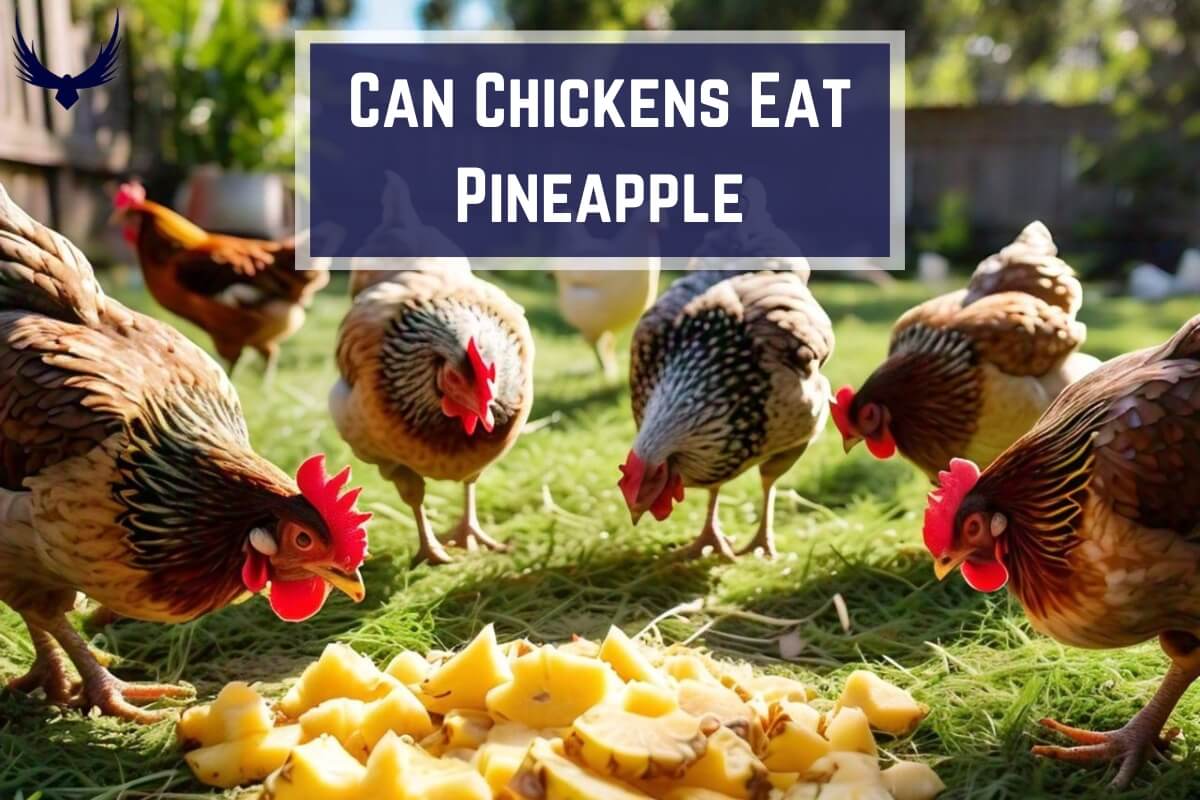In backyard farming, people often wonder what chickens can eat. Chickens eat grains, bugs, and other foods to stay healthy. But Can Chickens Eat Pineapple?
Let’s find out if chickens can enjoy this tropical fruit without any problems.
What is Pineapple and Can Chickens Eat Pineapple?
Pineapple is a tropical fruit that belongs to the Bromeliaceae family. It is characterized by its unique cylindrical shape, tough spiky skin, and a crown of green leaves at the top. The flesh of a pineapple is sweet, juicy, and slightly tart, with a vibrant yellow color when ripe. So, Can Chickens have Pineapple?
Yes, chickens can eat pineapple and it can be a healthy treat for them. Pineapple is a good source of vitamins and minerals for chickens. It can be a refreshing treat, especially in hot weather.
It’s important to give pineapple to chickens in small amounts to avoid digestive issues. Remove the tough skin and core before feeding it to chickens.
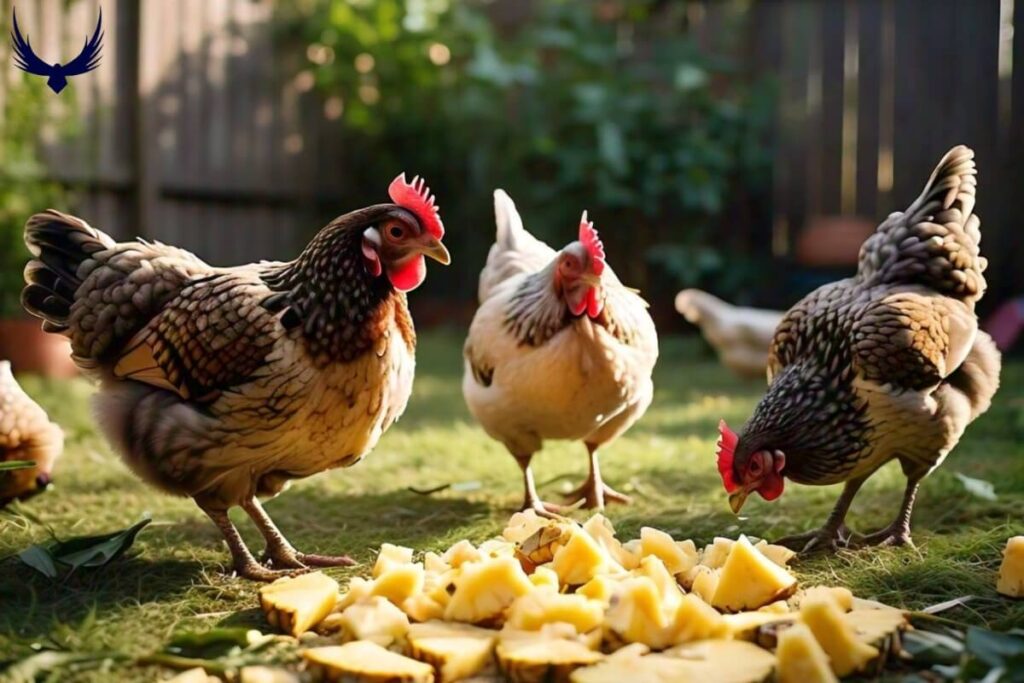
Pineapple should not replace their regular diet. Offer it occasionally alongside their usual feed. Overall, pineapple can be a safe and nutritious addition to a chicken’s diet when given in moderation.
Nutritional Benefits of Feeding Chickens Pineapple
Pineapple can provide various nutritional benefits to chickens when offered as an occasional treat to their regular diet. Following are the key nutrients found in pineapple and their benefits for chickens:
Vitamins
Vitamin C: Pineapple is an excellent source of vitamin C, an antioxidant that supports the immune system and helps with wound healing.
Vitamin B6: Pineapple contains vitamin B6 which is essential for energy metabolism and the production of red blood cells.
Folate: Pineapple provides folate, a B-vitamin that plays a role in cell growth and development.
Thiamine: This vitamin, also known as vitamin B1. It is involved in energy metabolism and nerve function.
Minerals
Manganese: Pineapple is a rich source of manganese which is important for bone development, metabolism, and reproduction in chickens.
Copper: This mineral is necessary for proper feather pigmentation and helps with iron absorption.
Potassium: Pineapple is a good source of potassium, an electrolyte that supports muscle function and nerve transmission.
Magnesium: This mineral is involved in energy production, bone development, and enzyme function in chickens.
Antioxidants
Bromelain: Pineapple contains bromelain, a proteolytic enzyme that acts as an antioxidant and aids in digestion and reduces inflammation.
Flavonoids: Pineapple is a source of flavonoids which are antioxidants that can help protect cells from oxidative stress.
Fiber
Pineapple is a good source of dietary fiber which can help in digestion and promote healthy gut function in chickens.
Which Part of the Pineapple Can Chickens Eat?
When feeding pineapple to chickens, it’s important to prepare it properly to ensure their safety and prevent digestive issues. Following are the parts of the pineapple that chickens can eat:
Flesh: The yellow, juicy flesh of the pineapple is the part that chickens can consume safely. It is a good source of vitamins, minerals, and natural sugars.
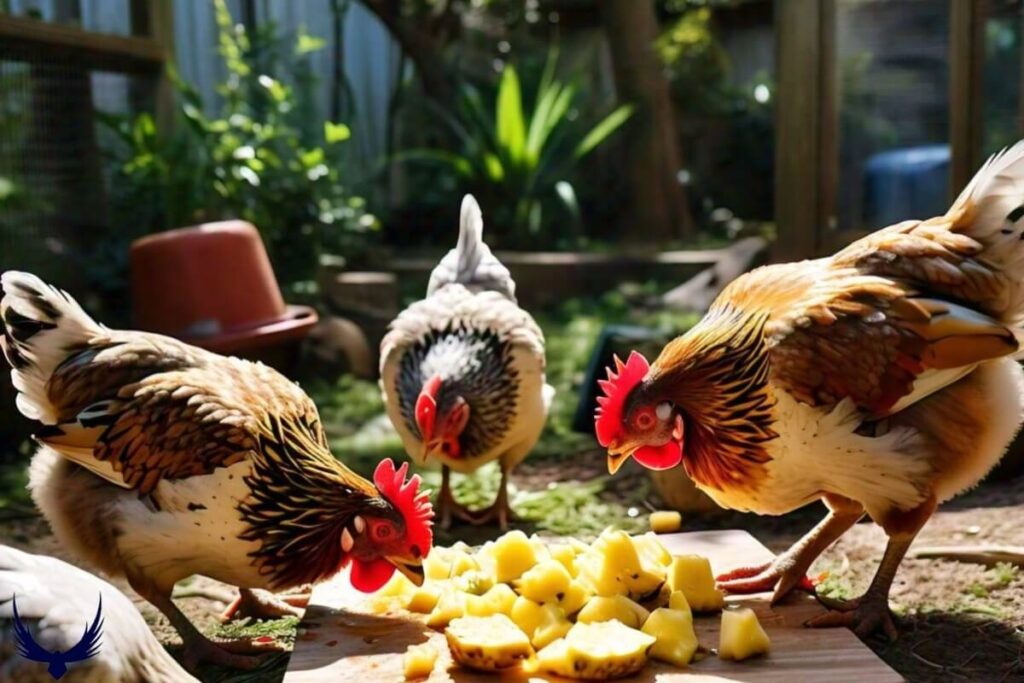
Core: The tough, fibrous core of the pineapple should be removed before feeding it to chickens. It is difficult for them to digest and can cause digestive issues or blockages if ingested.
Skin: The spiky, tough skin of the pineapple should not be fed to chickens. It is indigestible and can cause injuries or obstructions in their digestive tract.
Crown (Leaves): The green, spiky crown of leaves at the top of the pineapple should also be removed before feeding the fruit to your chickens. The leaves are tough and fibrous, making them difficult to digest and harmful if ingested.
How to Feed Pineapples to Your Chickens?
Following are the methods to feed and serve pineapples to chickens safely:
Preparation
- Choose ripe, fresh pineapples without signs of spoilage.
- Wash the pineapple thoroughly to remove any dirt or pesticide residues.
- Remove the crown (leaves) and skin.
- Cut out the tough, fibrous core.
- Chop the remaining flesh into small, bite-sized pieces (about 1/2 inch or smaller).
Serving Methods
Fresh chunks: Offer small pieces of fresh pineapple directly to your chickens. Place the chunks in a shallow dish or scatter them in their foraging area.
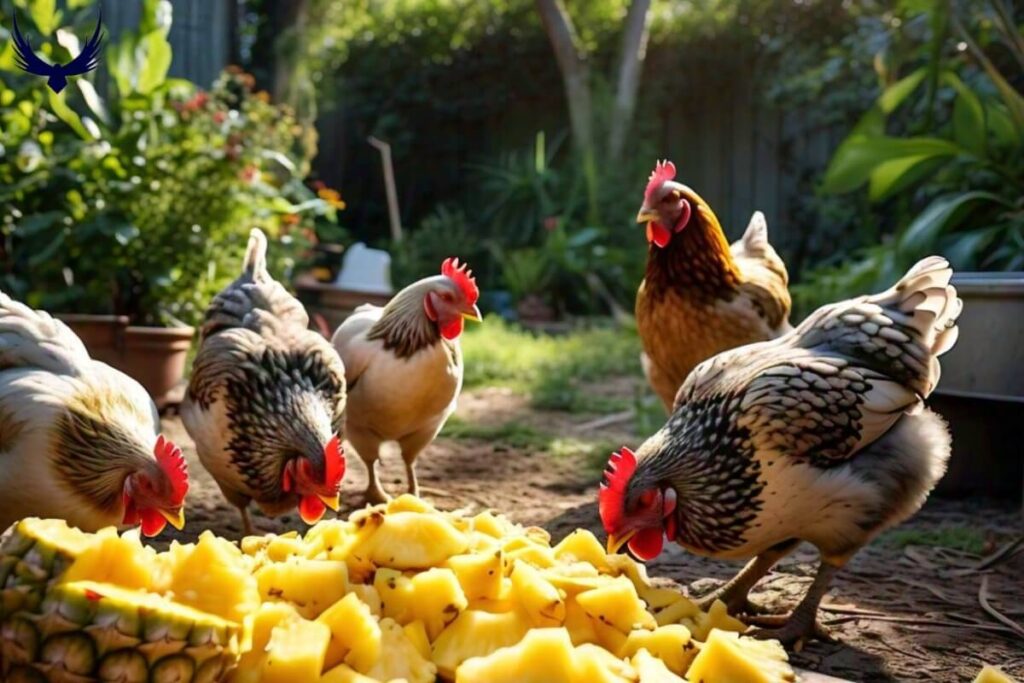
Mixed with other foods: Mix pineapple pieces with other chicken-safe fruits (such as Kiwi, Apples, Bananas, Grapes, and Strawberries) and vegetables (Celery, Broccoli, Jalapenos, and Tomatoes). Mix small amounts into their regular feed for added variety.
Frozen treat: Freeze pineapple chunks for a refreshing treat in hot weather. Place frozen pieces in a dish or hang them in a mesh feeder.
Pureed: Blend pineapple chunks into a puree. Mix the puree with their feed or put it separately in a shallow dish.
Feeding Guidelines
Start with small amounts to allow their digestive systems to adjust. Observe for any adverse reactions. Limit pineapple to no more than 10% of their daily diet. Offer pineapple as an occasional treat, not a daily food item.
Special Considerations
For chicks or younger birds, introduce pineapple even more gradually and in smaller pieces. During molting or egg-laying periods, give chickens more protein-rich foods instead of sugary treats like pineapple.
How Often Can Chickens Have Pineapple?
Chickens can have pineapple as an occasional treat, not as a regular part of their diet.
Frequency
Offer pineapple once or twice per week at most. Avoid daily feeding to prevent nutritional imbalances.
Quantity
Pineapple treats should not exceed 10% of daily diet. For an average adult chicken, 1 to 2 tablespoons of chopped pineapple per serving. For a flock of 4 to 6 chickens about 1/4 to 1/2 cup of chopped pineapple total.
Risks of Feeding Pineapple to Chickens
Pineapple can be a healthy treat for chickens when fed in moderation, there are some risks to be aware of. Following are the possible risks of feeding chickens’ pineapple:
Digestive Issues
Pineapple contains a significant amount of fiber which can be difficult for chickens to digest in large amounts. Giving too much pineapple to chickens can cause digestive issues like diarrhea, bloating, and discomfort. The high sugar in pineapple can also disrupt the balance of chicken’s gut microbiome if eaten too much.
Allergic Reactions
Some chickens might be allergic or sensitive to pineapple. It’s important to introduce pineapple slowly and watch for any bad reactions like trouble breathing, tiredness, or skin irritation.
Nutritional Imbalance
Overfeeding pineapple can lead to an imbalance in the chicken’s diet causing deficiencies or excesses of certain nutrients. Pineapple should never replace a balanced, complete diet for chickens, as it lacks essential nutrients like protein and certain vitamins and minerals.
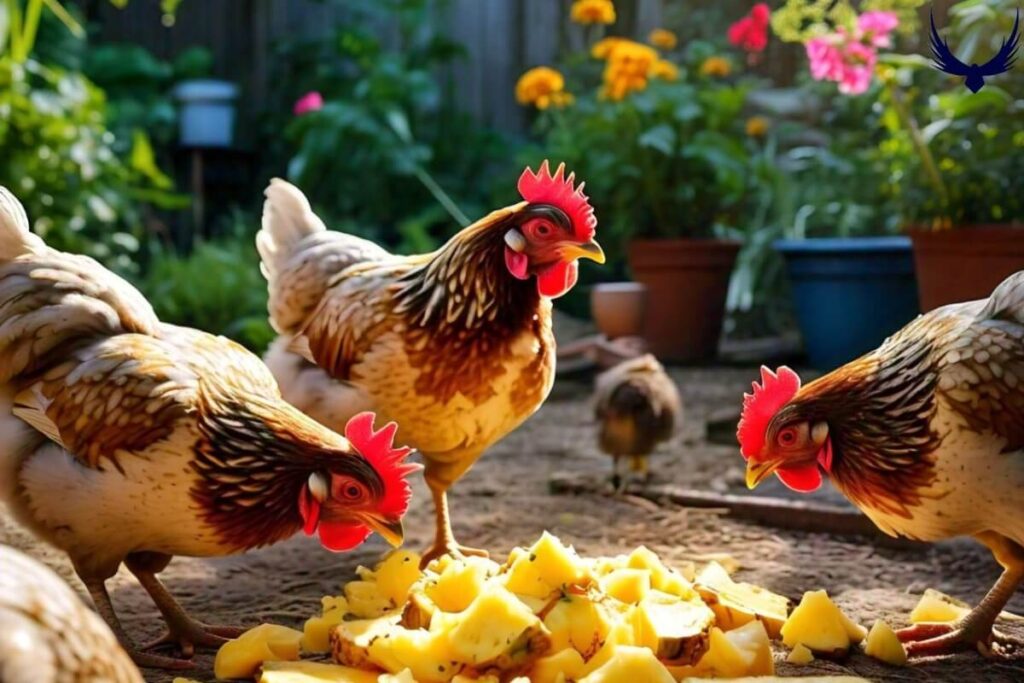
Choking Hazard
If pineapple chunks or slices are not properly chopped into small pieces, it can pose a choking hazard for chickens.
What Things to Consider Before Feeding Pineapple to Chickens?
There are several important factors to consider before feeding pineapple to chickens.
Pesticide Residue
Pineapples may contain residues of pesticides or other chemicals used during cultivation depending on the source and farming practices. Pineapples grown with pesticides can be harmful to chickens if they eat them a lot or for a long time.
Mold and Spoilage
Fresh pineapple can spoil quickly in warm and humid conditions. Feeding moldy or spoiled pineapple to chickens can cause illness and should be avoided.
Flock Health
Assess the overall health of your chickens before introducing new foods. Consider any ongoing health issues or medications that might interact with pineapple.
Age and Size
Younger or smaller chickens may need smaller pieces and lesser amounts. Older chickens might have different dietary needs or sensitivities.
Individual Sensitivities
Be aware that some chickens might have individual allergies or sensitivities to pineapple. Introduce pineapple gradually and observe each chicken’s reaction.
Season and Climate
Consider using pineapple as a hydrating treat during hot weather. Be cautious of overfeeding sugary treats in cooler weather when chickens are less active.
Are Pineapples Good for Chickens?
Pineapples can be a healthy treat for chickens when fed in moderation. They provide vitamins like vitamin C and B6, minerals such as manganese and potassium, and antioxidants that support overall health.
The fruit’s high-water content can help with hydration in hot weather. Pineapples are high in sugar and should not replace the balanced feed that forms the core of a chicken’s diet.
Can Baby Chicks Eat Pineapple?
Baby chicks can eat small amounts of pineapple, but it’s best to wait until they are at least 6 to 8 weeks old before introducing it. Their digestive systems are more developed when they are 2 to 3 month old.
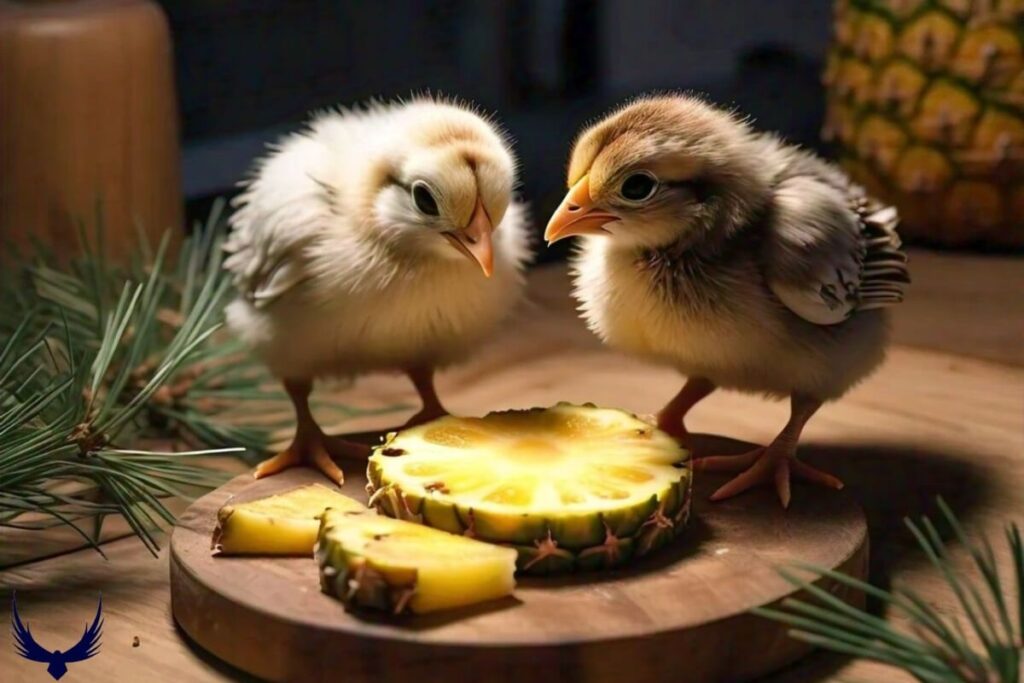
When offering pineapple to baby chicks, start with tiny pieces, no larger than a grain of rice and in very small quantities. Offer only few pieces per chick and the soft flesh ensuring all skin, core, and leaves are removed.
Can Chickens Eat Canned Pineapple?
Chickens can eat canned pineapple, but it should be offered with caution and in moderation. When choosing canned pineapple for chickens, opt for varieties packed in their own juice rather than syrup to avoid excessive sugar.
Rinse the pineapple well before giving it to the chickens to remove extra juice and preservatives. Canned pineapple is not as good as fresh pineapple because of processing and added ingredients.
Can Chickens Eat Whole Pineapples?
Chickens should not be given whole pineapples to eat. The tough spiky skin, fibrous core, and leaves can harm them. These parts can cause choking or stomach problems. Chickens cannot easily eat a whole pineapple.
Remove the inedible parts and give them small, soft pieces. This way chickens can enjoy the fruit without getting sick.
Can Chickens Eat Pineapple Skins?
Chickens should not eat pineapple skins. The tough, fibrous exterior of pineapples is difficult for chickens to digest and can pose health risks. The rough texture could damage the chicken’s crop or digestive tract.
It’s important to remove the skin and only give chickens the soft, fleshy part of the pineapple in small pieces.
FAQs – Do Chickens Eat Pineapple
Can Chickens Eat Pineapple Core?
Chickens shouldn’t eat pineapple core because it’s tough and hard to digest. It can cause digestive problems, blockages, or choking. Although the core has nutrients, it’s safer to remove the core and the skin.
Can Chickens Eat Pineapple Rinds?
Chickens should not eat pineapple rinds. The tough, spiky exterior of pineapples is not suitable for chicken consumption. The hard texture of the rind could hurt a chicken’s beak or digestive system. When giving chickens pineapple, remove the rind completely.
Can Chickens Eat Pineapple Scraps?
Chickens can eat some pineapple scraps, but caution is necessary. Edible scraps include small pieces of the flesh that remain after cutting the fruit for human consumption. Avoid giving chickens any tough or fibrous parts like the skin, core, or leaves. These inedible portions can cause digestive issues.
Can Chickens Eat Pineapple Leaves?
Chickens should not eat pineapple leaves. The leaves are tough, fibrous, and may contain compounds that could be irritating or toxic to chickens’ digestive systems. When feeding pineapple to chickens, always remove the leaves along with the skin and core, offering only the soft, edible flesh of the fruit.
Can Chickens Eat Pineapple Chunks?
Chickens can eat pineapple chunks if prepared correctly. Cut the soft fruit flesh into small pieces, removing the skin, core, and leaves. Pineapple chunks are a healthy snack, offering vitamins and hydration.

